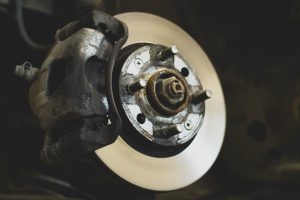Your car’s brakes are one of the most critical safety systems, and any unusual sound coming from them should never be ignored. Whether it’s a squeal, grind, or rattle, brake noise is often your vehicle’s way of telling you something’s wrong — or soon will be. Understanding what brake pad noise means, what causes it, and how to fix it can save you money, preserve your vehicle’s performance, and, most importantly, keep you safe on the road.
Why Do Brake Pads Make Noise?

Brake pads function by pressing against the rotor to create friction and stop the car. This intense contact can produce noise naturally, especially during specific driving conditions. However, persistent or abnormal brake noises typically indicate problems.
Types of Brake Pad Noise and What They Mean
| Noise | Common Cause | Should You Worry? |
|---|---|---|
| High-pitched squealing | Worn pads or glazed surfaces | Yes, check soon |
| Grinding | Pad worn down to metal backing | Urgent — can damage rotors |
| Clicking or rattling | Loose hardware or pad shims | Moderate — fix to avoid wear |
| Groaning or moaning | Moisture, dirty pads, or cheap materials | Not urgent unless persistent |
| Thumping | Warped rotors or uneven pad wear | Yes — inspect braking system |
Top Causes of Brake Pad Noise
Let’s dive into the most common reasons your brake pads might be making noise, what each sound indicates, and how to address the issue.
1. Worn-Out Brake Pads
Most brake pads have built-in wear indicators that emit a squealing noise when the pads reach a minimum thickness. If ignored, they wear down to metal-on-metal contact, creating a harsh grinding sound and damaging the rotors.
Fix: Replace the brake pads immediately. If rotors are scored, resurface or replace them as well.
2. Glazed Pads or Rotors
Overheating from aggressive braking or incorrect bedding-in can glaze pads or rotors, creating a smooth, glassy surface that squeals or screeches.
Fix: Resurface or replace the affected parts. Always bed-in new brake pads properly.
3. Poor-Quality Brake Pads
Low-grade pads may contain excessive metal content or poor friction material, leading to excessive noise, inconsistent stopping, or rapid wear.
Fix: Upgrade to OEM-quality or high-performance pads.
Buy Car Brake Pads online for reliable, high-quality options that match your vehicle.
4. Improper Installation or Missing Hardware
Improperly installed pads, missing shims, or anti-rattle clips can cause vibrations, clicking, or clunking noises during braking.
Fix: Inspect all installation hardware, use correct torque values, and ensure all clips and shims are installed properly.
5. Dust, Debris, or Rust Build-Up
Brake dust, road grime, or corrosion on rotors or pads can cause squeaking or grinding sounds.
Fix: Clean the braking components. Consider anti-seize lubrication on contact points (not on pad surface).
6. Warped Rotors or Uneven Pad Wear
Brake pads need a flat surface to contact. Warped rotors or uneven pad wear create pulsating noises and reduced braking power.
Fix: Replace warped rotors and inspect calipers or sliders for even pad wear.
How to Diagnose Brake Pad Noise
Use this checklist to determine the severity and likely cause of the noise:
Brake Noise Diagnostic Checklist
| Question | Implication |
|---|---|
| Does the noise occur when braking only? | Likely pad-related |
| Does it stop after warming up? | Could be moisture or surface rust |
| Is there a metallic grinding sound? | Pad likely worn to backing plate |
| Do you feel vibrations while braking? | Possible rotor warping or uneven wear |
| Is noise coming from one wheel only? | Sticking caliper or localized damage |
When Brake Noise Is Normal
Some brake noise can be considered normal under certain conditions:
-
Morning moisture: Dew or rain can cause temporary squealing.
-
Dust accumulation: Temporary noise from dirty environments.
-
Performance pads: High-friction racing pads can squeal under light braking.
These noises usually go away after a few minutes of driving.
Preventive Tips to Reduce Brake Noise
| Tip | Benefit |
|---|---|
| Use quality brake pads | Minimizes vibration and uneven wear |
| Install anti-rattle clips and shims | Reduces clicking and squealing |
| Properly torque lug nuts | Prevents rotor warping |
| Clean brake components regularly | Removes dust and road grime |
| Bed-in new pads correctly | Ensures even pad transfer and smooth braking |
Should I Replace My Brake Pads Now?

If you notice any of these signs along with noise, replacement is likely needed:
-
Braking feels less responsive
-
The brake pedal pulses or vibrates
-
Visible wear on brake pad thickness (under 3 mm)
-
Brake warning light is on
For high-quality replacements:
Buy Car Brake Pads online — Get trusted, vehicle-specific pads shipped fast.
Conclusion
Brake pad noise shouldn’t be ignored. While not all sounds signal danger, many are early warnings of wear, improper installation, or poor component quality. By learning what each noise means and acting early, you can avoid expensive repairs and ensure your vehicle’s braking system stays safe and reliable.
If your brake pads are squealing, grinding, or just making strange noises, take the time to inspect them or have a professional do it. And when it’s time to replace them,
Buy Car Brake Pads online for parts you can trust — because your safety rides on your brakes.